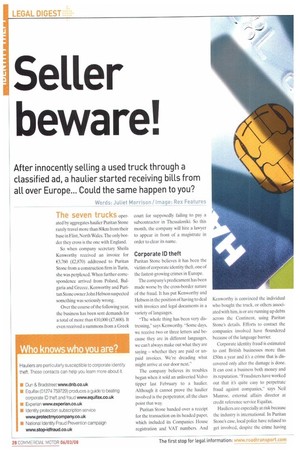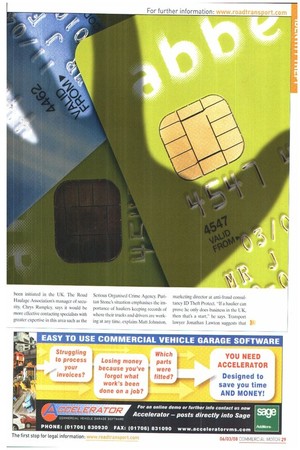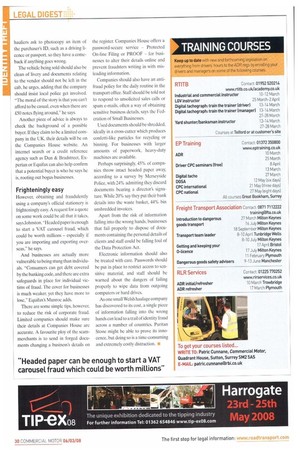Setter beware!
Page 28

Page 29

Page 30

If you've noticed an error in this article please click here to report it so we can fix it.
After innocently selling a used truck through a classified ad, a haulier started receiving bills from all over Europe... Could the same happen to you?
Words: Jutiet Morrison / image: Rex Featurei, The seven trucks operated by aggregates haulier Puritan Stone rarely travel more than 801on from their base in Hint, North Wales. The only border they cross is the one with England.
So when company secretary Sheila Kenworthy received an invoice for €3,760 (£2,870) addressed to Puritan Stone from a construction firm in Turin, she was perplexed. When further correspondence arrived from Poland, Bulgaria and Greece. Kenworthy and Puritan Stone owner John Hebson suspected something was seriously wrong.
Over the course of the following year, the business has been sent demands for a total of more than €10,000 (£7.600). It even received a summons from a Greek court for supposedly failing to pay a subcontractor in Thessaloniki. So this month, the company will hire a lawyer to appear in front of a magistrate in order to clear its name.
Corporate ID theft
Puritan Stone believes it has been the victim of corporate identity theft, one of the fastest-growing crimes in Europe.
The company's predicament has been made worse by the cross-border nature of the fraud. It has put Kenworthy and Hebson in the position of having to deal with invoices and legal documents in a variety of languages.
"The whole thing has been very distressing," says Kenworthy. "Some days, we receive two or three letters and because they are in different languages, we can't always make out what they are saying — whether they are paid or unpaid invoices. We're dreading what might arrive at our door next."
The company believes its troubles began when it sold an unliveried Volvo tipper last February to a haulier. Although it cannot prove the haulier involved is the perpetrator, all the clues point that way.
Puritan Stone handed over a receipt for the transaction on its headed paper, which included its Companies House registration and VAT numbers. And Kenworthy is convinced the individual who bought the truck, or others associated with him, is or are running up debts across the Continent, using Puritan Stone's details. Efforts to contact the companies involved have floundered because of the language barrier.
Corporate identity fraud is estimated to cost British businesses more than £50m a year and it's a crime that is discovered only after the damage is done. It can cost a business both money and its reputation. "Fraudsters have worked out that it's quite easy to perpetrate fraud against companies," says Neil Munroe. external affairs director at credit reference service Equifax.
Hauliers are especially at risk because the industry is international. In Puritan Stone's case, local police have refused to get involved, despite the crime having been initiated in the UK. The Road Haulage Association's manager of security, Chrys Rampley, says it would be more effective contacting specialists with greater expertise in this area such as the Serious Organised Crime Agency. Puritan Stone's situation emphasises the importance of hauliers keeping records of where their trucks and drivers are working at any time, explains Matt Johnston,
marketing director at anti-fraud consultancy ID Theft Protect. "If a haulier can prove he only does business in the UK, then that's a start," lie says. Transport Lawyer Jonathan Lawton suggests that )1 hauliers ask to photocopy an item of the purchaser's ID, such as a driving licence or passport, so they have a comeback if anything goes wrong.
The vehicle being sold should also be clean of livery and documents relating to the vendor should not be left in the cab, he urges, adding that the company should insist local police get involved. "The moral of the story is that you can't afford to be casual, even when there are £50 notes flying around," he says.
Another piece of advice is always to check the background of a possible buyer. If they claim to be a limited company in the UK, their details will be on the Companies House website. An internet search or a credit reference agency such as Dun & Bradstreet, Experian or Equifax can also help confirm that a potential buyer is who he says he is, rooting out bogus businesses.
Frighteningly easy However, obtaining and fraudulently using a company's official stationery is frighteningly easy. A request for a quote on some work could be all that it takes, says Johnston. -Headed paper is enough to start a VAT carousel fraud, which could be worth millions especially if you are importing and exporting overseas," he says.
And businesses are actually more vulnerable to being stung than individuals. "Consumers can get debt covered by the banking code, and there are extra safeguards in place for individual victims of fraud. The cover for businesses is much weaker, yet they have more to lose," Equifax's Munroe adds.
There are some simple tips. however, to reduce the risk of corporate fraud. Limited companies should make sure their details at Companies House arc accurate. A favourite ploy of the scammerchants is to send in forged documents changing a business's details on the register. Companies House offers a password-secure service Protected On-line Filing or PROOF for businesses to alter their details online and prevent fraudsters writing in with misleading information.
Companies should also have an antifraud policy for the daily routine in the transport office. Staff should be told not to respond to unsolicited sales calls or spam e-mails, often a way of obtaining sensitive business details, says the Federation of Small Businesses.
Used documents should be shredded, ideally in a cross-cutter which produces confetti-like particles for recycling or binning. For businesses with larger amounts of paperwork, heavy-duty machines are available.
Perhaps surprisingly, 45% of companies throw intact headed paper away, according to a survey by Merseyside Police, with 24% admitting they discard documents bearing a director's signature. While 20% say they put their bank details into the waste basket, 44% bin unshredded invoices.
Apart from the risk of information falling into the wrong hands, businesses that fail properly to dispose of documents containing the personal details of clients and staff could be falling foul of the Data Protection Act.
Electronic information should also be treated with care. Passwords should be put in place to restrict access to sensitive material, and staff should be warned about the dangers of failing properly to wipe data from outgoing computers or hard drives.
As one small Welsh haulage company has discovered to its cost, a single piece of information falling into the wrong hands can lead to a trail of identity fraud across a number of countries. Puritan Stone might be able to prove its innocence, but doing so is a time-consuming and extremely costly distraction. •












































































































































































